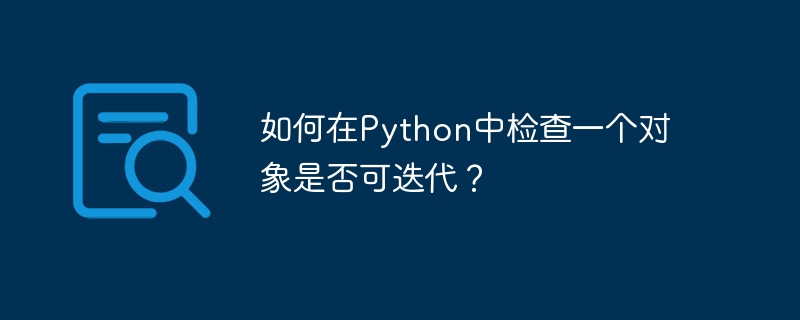如何在Python中检查一个对象是否可迭代?

可迭代对象是可以使用循环或可迭代函数迭代其所有元素的对象。列表、字符串、字典、元组等都称为可迭代对象。
在 Python 语言中,有多种方法可以检查对象是否可迭代。让我们一一看看。
使用循环
在Python中,我们有两种循环技术,一种是使用“for”循环,另一种是使用“while”循环。使用这两个循环中的任何一个,我们可以检查给定的对象是否可迭代。
示例
在这个例子中,我们将尝试使用“for”循环迭代一个对象并检查它是否被迭代。以下是代码。
l = ["apple",22,"orange",34,"abc",0.3]
try:
for i in l:
print(i)
print("Given object is iterable")
except TypeError:
print("Given object is not iterable")
输出
apple 22 orange 34 abc 0.3 Given object is iterable
示例
让我们看另一个示例,使用 for 循环检查给定对象是否可迭代。
integer = 23454
try:
for i in integer:
print(i)
print("Given object is iterable")
except TypeError:
print("Given object is not iterable")
输出
以下是检查给定对象是否可迭代的代码的输出。
Given object is not iterable
使用 iter() 方法
Python 中有一个名为 iter() 的函数,它检查给定的对象是否可迭代。
示例
在这个例子中,我们将要迭代的对象和iter类传递给hasattr()函数的函数。然后,使用 iter() 方法检查该对象是否被迭代。
integer = 23454
if hasattr(integer, '__iter__'):
my_iter = iter(integer)
print("Given object is iterable")
else:
print("Given object is not iterable")
输出
Given object is not iterable
使用collections.abc模块
在Python中,collections.abc模块提供了名为Iterable的抽象类,可以用来检查对象是否可迭代。
示例
在这里,当我们想要检查给定的对象是否可迭代时,我们必须将对象和“Iterable”抽象类作为参数传递给 isinstance() 函数。
from collections.abc import Iterable
integer = 23454
if isinstance(integer, Iterable):
print("Given object is iterable")
else:
print("Given object is not iterable")
输出
以下是生成的输出 -
Given object is not iterable
示例
让我们再看一个示例来检查给定对象是否可迭代。
from collections.abc import Iterable
dic = {"name":["Java","Python","C","COBAL"],"Strength":[10,200,40,50,3]}
if isinstance(dic, Iterable):
print("Given object is iterable")
else:
print("Given object is not iterable")
输出
上述程序的输出显示为 -
Given object is iterable
使用 try 和 except
Python 中有“try”和“ except”,它们会处理发生的错误。这些还检查给定对象是否可迭代。
示例
这是一个使用 iter() 函数以及 try 和 except 来检查给定对象是否可迭代的示例。
dic = {"name":["Java","Python","C","COBAL"],"Strength":[10,200,40,50,3]}
try:
iter(dic)
print('Given object is iterable')
except TypeError:
print('Given object is not iterable')
输出
Given object is iterable
以上是如何在Python中检查一个对象是否可迭代?的详细内容。更多信息请关注PHP中文网其他相关文章!

热AI工具

Undresser.AI Undress
人工智能驱动的应用程序,用于创建逼真的裸体照片

AI Clothes Remover
用于从照片中去除衣服的在线人工智能工具。

Undress AI Tool
免费脱衣服图片

Clothoff.io
AI脱衣机

AI Hentai Generator
免费生成ai无尽的。

热门文章

热工具

记事本++7.3.1
好用且免费的代码编辑器

SublimeText3汉化版
中文版,非常好用

禅工作室 13.0.1
功能强大的PHP集成开发环境

Dreamweaver CS6
视觉化网页开发工具

SublimeText3 Mac版
神级代码编辑软件(SublimeText3)

热门话题
 mysql 是否要付费
Apr 08, 2025 pm 05:36 PM
mysql 是否要付费
Apr 08, 2025 pm 05:36 PM
MySQL 有免费的社区版和收费的企业版。社区版可免费使用和修改,但支持有限,适合稳定性要求不高、技术能力强的应用。企业版提供全面商业支持,适合需要稳定可靠、高性能数据库且愿意为支持买单的应用。选择版本时考虑的因素包括应用关键性、预算和技术技能。没有完美的选项,只有最合适的方案,需根据具体情况谨慎选择。
 mysql安装后怎么使用
Apr 08, 2025 am 11:48 AM
mysql安装后怎么使用
Apr 08, 2025 am 11:48 AM
文章介绍了MySQL数据库的上手操作。首先,需安装MySQL客户端,如MySQLWorkbench或命令行客户端。1.使用mysql-uroot-p命令连接服务器,并使用root账户密码登录;2.使用CREATEDATABASE创建数据库,USE选择数据库;3.使用CREATETABLE创建表,定义字段及数据类型;4.使用INSERTINTO插入数据,SELECT查询数据,UPDATE更新数据,DELETE删除数据。熟练掌握这些步骤,并学习处理常见问题和优化数据库性能,才能高效使用MySQL。
 mySQL下载完安装不了
Apr 08, 2025 am 11:24 AM
mySQL下载完安装不了
Apr 08, 2025 am 11:24 AM
MySQL安装失败的原因主要有:1.权限问题,需以管理员身份运行或使用sudo命令;2.依赖项缺失,需安装相关开发包;3.端口冲突,需关闭占用3306端口的程序或修改配置文件;4.安装包损坏,需重新下载并验证完整性;5.环境变量配置错误,需根据操作系统正确配置环境变量。解决这些问题,仔细检查每个步骤,就能顺利安装MySQL。
 如何针对高负载应用程序优化 MySQL 性能?
Apr 08, 2025 pm 06:03 PM
如何针对高负载应用程序优化 MySQL 性能?
Apr 08, 2025 pm 06:03 PM
MySQL数据库性能优化指南在资源密集型应用中,MySQL数据库扮演着至关重要的角色,负责管理海量事务。然而,随着应用规模的扩大,数据库性能瓶颈往往成为制约因素。本文将探讨一系列行之有效的MySQL性能优化策略,确保您的应用在高负载下依然保持高效响应。我们将结合实际案例,深入讲解索引、查询优化、数据库设计以及缓存等关键技术。1.数据库架构设计优化合理的数据库架构是MySQL性能优化的基石。以下是一些核心原则:选择合适的数据类型选择最小的、符合需求的数据类型,既能节省存储空间,又能提升数据处理速度
 mysql安装后怎么优化数据库性能
Apr 08, 2025 am 11:36 AM
mysql安装后怎么优化数据库性能
Apr 08, 2025 am 11:36 AM
MySQL性能优化需从安装配置、索引及查询优化、监控与调优三个方面入手。1.安装后需根据服务器配置调整my.cnf文件,例如innodb_buffer_pool_size参数,并关闭query_cache_size;2.创建合适的索引,避免索引过多,并优化查询语句,例如使用EXPLAIN命令分析执行计划;3.利用MySQL自带监控工具(SHOWPROCESSLIST,SHOWSTATUS)监控数据库运行状况,定期备份和整理数据库。通过这些步骤,持续优化,才能提升MySQL数据库性能。
 mysql 需要互联网吗
Apr 08, 2025 pm 02:18 PM
mysql 需要互联网吗
Apr 08, 2025 pm 02:18 PM
MySQL 可在无需网络连接的情况下运行,进行基本的数据存储和管理。但是,对于与其他系统交互、远程访问或使用高级功能(如复制和集群)的情况,则需要网络连接。此外,安全措施(如防火墙)、性能优化(选择合适的网络连接)和数据备份对于连接到互联网的 MySQL 数据库至关重要。
 Navicat查看MongoDB数据库密码的方法
Apr 08, 2025 pm 09:39 PM
Navicat查看MongoDB数据库密码的方法
Apr 08, 2025 pm 09:39 PM
直接通过 Navicat 查看 MongoDB 密码是不可能的,因为它以哈希值形式存储。取回丢失密码的方法:1. 重置密码;2. 检查配置文件(可能包含哈希值);3. 检查代码(可能硬编码密码)。
 HadiDB:Python 中的轻量级、可水平扩展的数据库
Apr 08, 2025 pm 06:12 PM
HadiDB:Python 中的轻量级、可水平扩展的数据库
Apr 08, 2025 pm 06:12 PM
HadiDB:轻量级、高水平可扩展的Python数据库HadiDB(hadidb)是一个用Python编写的轻量级数据库,具备高度水平的可扩展性。安装HadiDB使用pip安装:pipinstallhadidb用户管理创建用户:createuser()方法创建一个新用户。authentication()方法验证用户身份。fromhadidb.operationimportuseruser_obj=user("admin","admin")user_obj.






